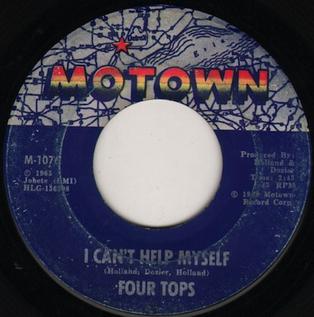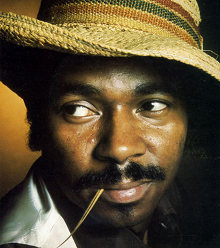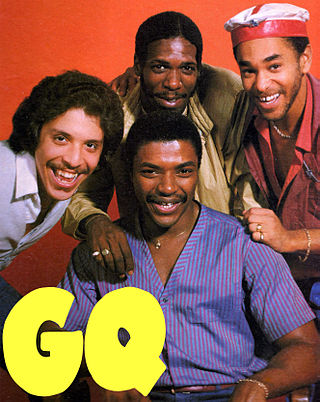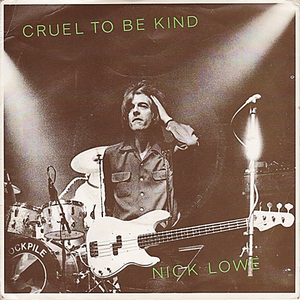Related Research Articles

KC and the Sunshine Band is an American disco and funk band that was founded in 1973 in Hialeah, Florida. Their best-known songs include the hits "That's the Way ", "(Shake, Shake, Shake) Shake Your Booty", "I'm Your Boogie Man", "Keep It Comin' Love", "Get Down Tonight", "Boogie Shoes", "Please Don't Go" and "Give It Up". The band took its name from lead vocalist Harry Wayne Casey's last name ('KC') and the 'Sunshine Band' from KC's home state of Florida, the Sunshine State. The group has had six top 10 singles, five number one singles and a number two single on the Billboard Hot 100 chart.

"I Can't Help Myself (Sugar Pie Honey Bunch)" is a 1965 song recorded by the Four Tops for the Motown label.
Machine was an American funk, disco and rock group, formed in New York City and originally active from 1977 to 1981. The band reached its biggest success with the single "There but for the Grace of God Go I", which became a disco hit in 1979.

Van Allen Clinton McCoy was an American record producer, arranger, songwriter and singer. He is known for his 1975 internationally successful hit "The Hustle". He has approximately 700 song copyrights to his credit, and produced songs by such recording artists as Gladys Knight & the Pips, The Stylistics, Aretha Franklin, Brenda & the Tabulations, David Ruffin, Peaches & Herb, Lesley Gore, and Stacy Lattisaw.
Claudja Barry is a Jamaican-born Canadian singer. Her successful songs were "Down and Counting", "Boogie Woogie Dancin' Shoes", "Dancing Fever", and others. As an actress, she is known for appearing in the European versions of stage musicals AC/DC and Catch My Soul.

"You Don't Know Me" is a song written by Eddy Arnold and Cindy Walker in 1955. "You Don't Know Me" was first recorded by Arnold that year and released as a single on April 21, 1956, on RCA Victor. The best-selling version of the song is by Ray Charles, who took it to number 2 on the Billboard Hot 100 chart in 1962, after releasing the song on his number 1 album Modern Sounds in Country and Western Music. The first version of the song to make the Billboard charts was by Jerry Vale in 1956, peaking at number 14 on the pop chart. Arnold's version charted two months later, released as an RCA Victor single, 47–6502, backed with "The Rockin' Mockin' Bird", which reached number 10 on the Billboard country chart. Cash Box magazine, which combined all best-selling versions at one position, included a version by Carmen McRae that never appeared in the Billboard Top 100 Sides listing.

"Knock on Wood" is a 1966 hit song written by Eddie Floyd and Steve Cropper and originally performed by Floyd. The song has become covered by later artists, most notably Amii Stewart in 1979. Stewart's disco version was the most successful on weekly music charts.

"Daydream Believer" is a song composed by American songwriter John Stewart shortly before he left The Kingston Trio. It was originally recorded by the Monkees, with Davy Jones singing the lead. The single reached No. 1 on the U.S. Billboard Hot 100 chart in December 1967, remaining there for four weeks, and peaked at No. 5 on the UK Singles Chart. It was the Monkees' third and last No. 1 hit in the U.S.

"I'm Not in Love" is a song by British group 10cc, written by band members Eric Stewart and Graham Gouldman. It is known for its innovative and distinctive backing track, composed mostly of the band's multitracked vocals. Released in the UK in May 1975 as the second single from the band's third album, The Original Soundtrack, it became the second of the group's three number-one singles in the UK between 1973 and 1978, topping the UK Singles Chart for two weeks. "I'm Not in Love" became the band's breakthrough hit outside the United Kingdom, topping the charts in Canada and the Republic of Ireland as well as peaking within the top ten of the charts in several other countries, including Australia, Germany, New Zealand, Norway and the United States.
The Heptones are a Jamaican rocksteady and reggae vocal trio most active in the 1960s and early 1970s. They were one of the more significant trios of that era, and played a major role in the gradual transition between ska and rocksteady into reggae with their three-part harmonies. The Heptones were contemporaries of the Wailers and the Maytals, and every bit their equal in the mid-1960s.

"Disco Inferno" is a song by American disco band the Trammps from their 1976 fourth studio album of the same name. With two other cuts by the group, it reached No. 1 on the US Billboard Dance Club Songs chart in early 1977, but had limited mainstream success until 1978, after being included on the soundtrack to the 1977 film Saturday Night Fever, when a re-release hit number eleven on the Billboard Hot 100 chart.

Evie Sands is an American singer, songwriter and musician.

GQ was an American group, formed in The Bronx, New York, primarily noted for its success in funk, R&B, soul music and disco. The core membership of the group commenced playing professionally, under different group names, as of 1968.
"Disco Nights (Rock-Freak)" is a song written by Emanuel LeBlanc, Herb Lane, Keith Crier and Paul Service and performed by American band GQ, from their 1979 debut studio album Disco Nights. The song was produced by Larkin Arnold, Beau Ray and Fleming Jimmy Simpson. The original title is "(Rock-Freaks) Disco / Boogie".

"With You I'm Born Again" is a 1979 duet written by Carol Connors and David Shire that originated on the soundtrack of the 1979 motion picture Fast Break. It was performed by Motown recording artists Billy Preston and Syreeta Wright and became an international hit for the duo, reaching number four on the Billboard Hot 100 and number two on the UK singles chart.

"Cruel to Be Kind" is a song co-written by Nick Lowe and his former bandmate Ian Gomm while the pair were in Brinsley Schwarz. The song only appeared as a 1978 B-side until Columbia Records convinced Lowe to rerecord it as a potential solo single. Musically, the song was inspired by "The Love I Lost" by Harold Melvin & the Blue Notes, an influence reflected in more recent performances of the song.

Disco Nights is the debut album by American soul/disco group GQ, released in 1979 on the Arista label. The lead single "Disco Nights " was a major crossover hit, topping the R&B chart and peaking at #12 on the pop chart. The follow-up, a cover of Billy Stewart's 1965 classic "I Do Love You", also made the R&B top 5 and the pop top 20. On the back of its hit singles, the album became a big seller. It reached #2 R&B and #13 pop and was certified Platinum by the RIAA.

Two is the second album by American soul/disco group GQ, released in 1980 on the Arista label. It peaked at #9 on the R&B chart and #46 on the pop listing. Unlike its predecessor Disco Nights, no single from this album crossed over to the Billboard Hot 100, but "Sitting in the Park" and "Standing Ovation" reached #9 and #12 respectively on the R&B chart. The former was, like "I Do Love You" from Disco Nights, a cover of a 1965 Billy Stewart recording.
"Sitting in the Park" is a 1965 song written and performed by Billy Stewart. The single was Stewart's fourth and most successful entry on the soul chart in the United States. "Sitting in the Park" peaked at number four on the soul chart and number twenty-four on the Billboard Hot 100. The song was featured on his 1965 album, I Do Love You.

"Give Him a Great Big Kiss" is a song written by Shadow Morton and performed by the Shangri-Las. It debuted at number 83 on the Billboard Hot 100 in late December 1964, and peaked at #18 for two weeks in late January/early February 1965. It was featured on their 1965 album Leader of the Pack.
References
- ↑ "Billy Stewart, "I Do Love You" 1965 Chart Positions" . Retrieved November 28, 2016.
- ↑ "Billy Stewart, I Do Love You". Discogs . 1966. Retrieved November 28, 2016.
- ↑ "Billy Stewart, "I Do Love You" Single Release" . Retrieved November 28, 2016.
- ↑ "Billy Stewart, "I Do Love You" 1969 Chart Position" . Retrieved November 28, 2016.
- ↑ "GQ, "I Do Love You" Chart Positions" . Retrieved November 28, 2016.
- ↑ "GQ, Disco Nights". Discogs . January 1979. Retrieved November 28, 2016.
- ↑ "Billboard Top 100 - 1979" . Retrieved November 28, 2016.
- ↑ "Barbara Mason, Oh How It Hurts". Discogs . 1968. Retrieved November 28, 2016.
- ↑ "Jackie Edwards, "I Do Love You" Single Release" . Retrieved November 28, 2016.
- ↑ "The Heptones, "I Do Love You" Single Release" . Retrieved November 28, 2016.
- ↑ "Janet Kay, "I Do Love You" Single Release" . Retrieved November 28, 2016.